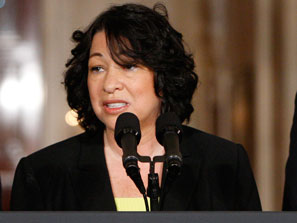 Paul Secunda has an interesting guest post on the ACS Blog regarding the role of the Ricci case in the confirmation hearings. Meanwhile, over at the Federalist Society website, our former colleague Scott Moss is part of a lively ongoing debate on the hearings.
Paul Secunda has an interesting guest post on the ACS Blog regarding the role of the Ricci case in the confirmation hearings. Meanwhile, over at the Federalist Society website, our former colleague Scott Moss is part of a lively ongoing debate on the hearings.

At the Federalist Society website …
Suprisingly, not a heck of a lot of substance there. Barely a mention of the Second Amendment and none of incorporation, which is disappointing, since both arose frequently during the hearings.
I found more insight on the #sotoshow Twitter feed.
Casual readers with limited time are advised that former Marquette professor Scott Moss is about the only one worth reading.
But on the whole, the commentary would likely be more fruitful if the others just ignored Ed Whelan and Wendy Long. They add little or nothing to the debate as it is.
And of course Prof. Seidman going berserk over his own false dichotomy was quite entertaining.
Here are a couple of posts related to some other alleged criticisms of Sotomayor:
A swing and a miss
Another Volokh conspiracist
That was some notably painless “anklebiting,” as Prof. Esenberg calls it, by the Volokhians.
Confirmation junkies may be interested in my impression of the the hearings from this morning’s Joy Cardin radio show:
http://www.wpr.org/cardin/index.cfm?strDirection=Prev&dteShowDate=2009%2D07%2D16%2008%3A00%3A00
I don’t quite follow Paul’s suggestion that there was no way that “Judge Sotomayor, or her fellow Second Circuit panelists, could have predicted that the Supreme Court would have come to this legal outcome” or that the Ricci outcome was dictated by well established precedent. Half of the Second Circuit – in seeking rehearing en banc – thought that it presented issues of first impression. Certainly the idea that the result was dictated by the results in Hayden or Bushey seems, at best, debatable.
While I think that the Ricci majority got it right, I can certainly see how others might differ. But it certainly does not seem to have been a clearly settled issue.
I listened to a couple of Republican senators comment about Judge Sotomayor this morning. Her judicial record is solidly mainstream, they said; they can take no issue with it. Their concern is about her off-the-bench comments and speeches, and the “cognitive dissonance” between her words there and her rulings; this disturbs them.
Wait—isn’t that what we all want from a judge? To follow the law and not just enact personal beliefs? And to do otherwise, isn’t that “activism”? So … Sotomayor’s doing exactly what these senators believe ALL judges should do; but her AVOIDING “activism” disturbs them?
Talk about your cognitive dissonance …
Can the lack of a disparate impact be used as a sword, as well as a shield, when a local municipality takes a race neutral action under Title VII? It seems to me that some observers saw the precedent as saying “yes,” while others (notably Judge Cabranes) saw the precedent as leaving the issue open. The answer to the question, according to the Supreme Court in Ricci, is “sometimes.” By splitting the difference, the majority of the Court took a position that was not articulated by any of the Second Circuit Judges on the motion for a rehearing en banc. I think it is fair to describe the Ricci holding as “unanticipated.”
I don’t think its that simple. None of the judges on the Second Circuit articulated the precise disposition at the Supreme Court because those who would have granted rehearing did not articulate any disposition. They merely said that the issue was novel and unworthy of resolution by summary order.
While I agree that reasonable people can disagree on the outcome on Ricci, I just can’t see the idea that the panel result was an application of well settled law such that the way in which the panel handled it was appropriate and, as Paul argues, the Supreme Court’s disposition of the case was judicial activism (assuming you believe that SCOTUS not following a Circuit’s precedent – or even overruling its own – is “activism.”
As for whether one could anticipate SCOTUS’ holding in Ricci, one could, as I said, argue for different results but Justice Kennedy’s resolution of the tension between the statute’s plain injunction against disparate treatment and the need for employers to avoid exposure to disparate treatment claims seems reasonable and, without intending to slight it, a fairly obvious possibility.
I don’t think this disqualifies Judge Sotomayor from serving on the Supreme Court (and even if I did, it won’t). But, unless I am missing something that no one else in the many commentaries that I have read seems to have gotten either, it is what it is.
Thanks again for the Federalist Society link. What a hoot.
Of particular note is the way Clarence Thomas’s testimony is entitled to meticulous parsing heavily weighted in his favor and even the personal reminiscences of Wendy Long.
Whereas Sonia Sotomayor’s alleged failure of clarity is reduced to a rather uncharitable (and comically fallacious) dilemma: She’s either stupid or she’s a liar.
Also, Ed Whelan’s comic admonition to Scott Moss: “Don’t you dare try and confuse us with your fog of statistics.”
No wonder the more reasonable observers have apparently withdrawn from the “debate.”